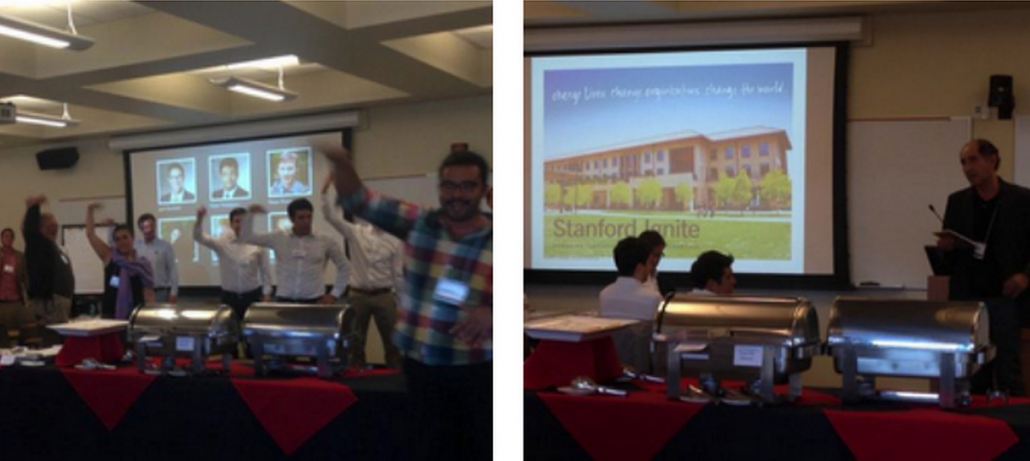Chile, California and the Future of Collaborative Innovation
What is innovation? How best to create the conditions in which innovation thrives? How might this work in Chilean companies? These are big questions, and we had the great privilege to discuss them all at an event organized by the Chile California Council.

What is innovation? How best to create the conditions in which innovation thrives? How might this work in Chilean companies?
These are big questions, and we had the great privilege to discuss them all last night at an event organized by the Chile California Council.
Ivan Vera’s Club de Innovacion brought 28 Chilean executives to Silicon Valley to explore possibilities for intrapreneurship and innovation. Along with visits to Google, SRI and a biotechnology incubator, the group stopped at the Stanford Graduate School of Business for a collaborative conversation with Stanford d.School students, Chileans based in Silicon Valley, academics from the Universidad de Concepcion in the south of Chile, and a few Californians with ties to Chile (like me!)
Juan Eduardo Ibanez leads the Chile California Council. A lawyer by profession, Juan is passionate about fostering real dialogue between Chile and California to design new solutions to shared challenges. Chile and California are quite similar in geography, and this collaboration spans many different topics and industries, such as technology, wine and renewable energy. Last fall he organized the Chile California Conference, during which academics from both countries shared their perspectives on topics like inequality, water politics, and the growth mindset in education. These discussions go far deeper than the typical happy hour, and last night’s was no exception.
The event began with presentations about design thinking, Stanford’s international reach, and how educators must move from teaching problem-solving to problem-finding to prepare tomorrow’s leaders to meet tomorrow’s challenges.
Next we started small-group discussions. My table included Chile’s most influential advocate for innovation and entrepreneurship, a pharmacist who leads scientific innovation programs at a top university in the south of Chile, a professor of corporate governance, an American winemaker making premium wines on her family’s land in Chile’s Casablanca Valley, a Chilean academic/entrepreneur who teaches at Berkeley (Go Bears!), a Chilean Googler, a Stanford d.School fellow focused on renewable energy in emerging markets, and me.
I loved sharing what we’re building here at Bridgecrest Medical (including mobile and wearable technology solutions to prevent fatigue-related accidents on mining sites. There’s a huge need for this in Chile, where mining is the main industry.)
The big question: How best to encourage innovation within Chilean companies?
We began with a long list of problems: risk aversion, lack of collaboration, hierarchy, obedience, fear of offending people, mistrust, a culture that places tremendous shame and secrecy around failure, tradition, fixed mindset, lack of incentives (many of Chile’s most powerful companies gained their market share through structural and regulatory changes and these incumbents understandably fear radical change), etc.
Soon we stopped complaining and began to talk about the good news. Chile is changing. All it takes is a few positive leaders to create a movement. Young leaders, especially “outsiders” (from outside Santiago, outside the most prestigious neighborhoods, outside the traditional networks…) have the energy and motivation to build new possibilities. We must empower these leaders with one-on-one mentoring and by sharing their stories and experiences.
More specifically, what could corporate leaders do in the short-to-medium term to foster innovation?
Our initial answers focused on hiring. What if there were more incentives to hire immigrants and talented people from unconventional backgrounds? How might that impact the corporate culture?
Overall, I learned a ton and questioned my own biases on many of these topics. And I got to reconnect with Chile, a country where I lived for four wonderful years. Thank you for the invitation!
Images via @Chile_CA on Twitter. Originally posted on LinkedIn.